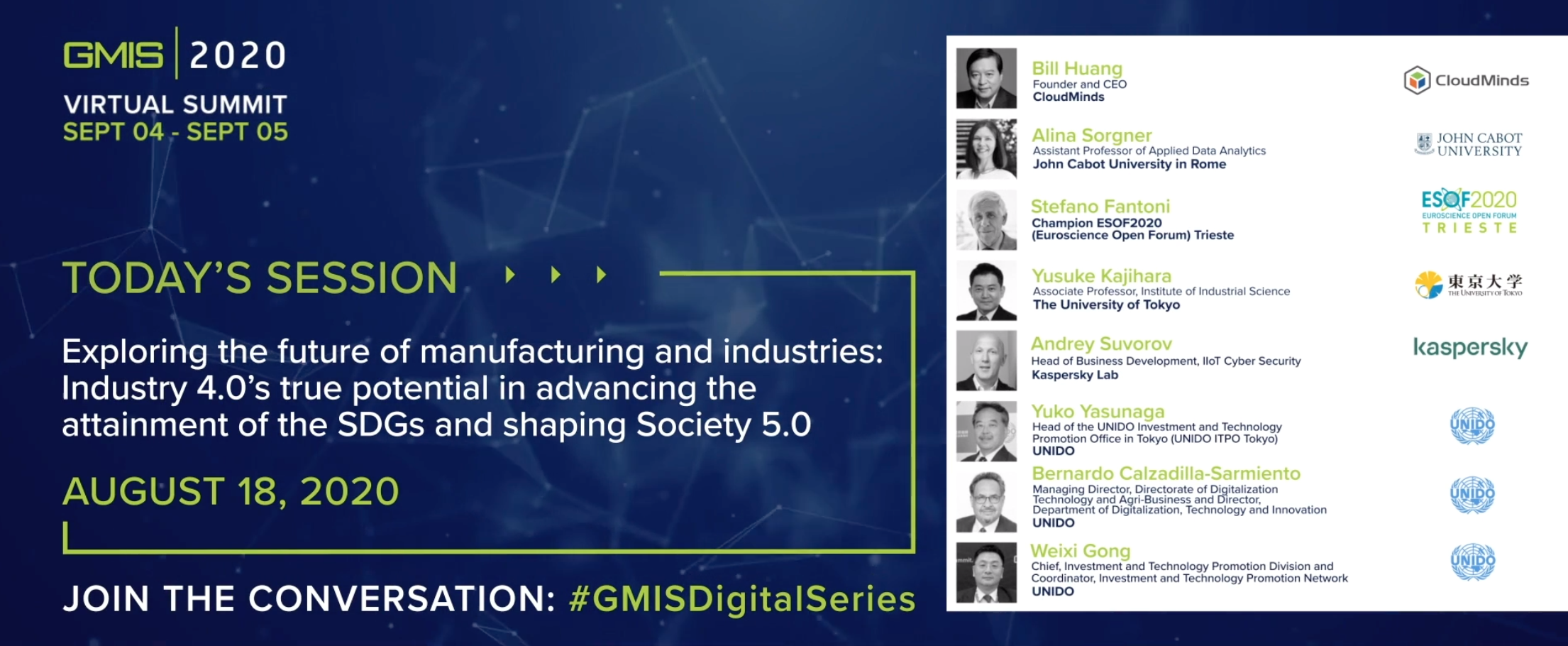Event Report: How will Industry 4.0 shape Society 5.0?
31.08.2020
VIENNA, 18 August —The United Nations Industrial Development Organization’s ITP Network has convened an expert panel to discuss “Exploring the Future of Manufacturing and Industries: Industry 4.0’s Potential in Advancing the Attainment of the SDGs and Shaping Society 5.0”. The panel discussion was part of the GMIS Digital Series of online webinar discussions on the Fourth Industrial Revolution, foreshadowing the GMIS 2020 Virtual Summit taking place on 4 and 5 September.
Bernardo Calzadilla-Sarmiento, UNIDO Managing Director, Directorate of Digitalization, Technology and Agri-Business, noted that the COVID-19 pandemic has exerted significant downward pressure on global GDP growth, global value chains and manufacturing trade, and indeed on development spending.
“However, it is also evident that the COVID-19 pandemic provides us with a big opportunity to accelerate progress towards collaborative solutions to development issues, most notably through advanced manufacturing technologies and digitalization,” he said.
“Even prior to the crisis, global manufacturing was in the midst of an unprecedented and rapid change due to the convergence of the digital and traditional sectors. COVID-19 has precipitated this situation where digitalization is taking centre-stage.” Professor Stefano Fantoni of the Euroscience Open Forum 2020 stressed the integration of science and manufacturing and innovation systems, especially for sustainability, “the common denominator”.
Yusuke Kajihara, Associate Professor, Institute of Industrial Science, University of Tokyo, identified two common problems with design optimization, namely obtaining micro-scale dynamics and rapid assembly. He advocated that through combining THZ nanoscopy, adhesiveless joining and artificial intelligence, we could improve time productivity ten-fold and working productivity 100-fold, especially through new innovations such as atomic layer semi-conductors, artificial organs, micro-needles and implantable devices in the brain.
Alina Sorgner, Assistant Professor of Data Analytics, John Cabot University, Rome, observed that while women’s participation in the workforce was increasing, there was also a defeminization of labour in the manufacturing sector. This, she said, could be exacerbated as new modes of production require new skills which are often in short supply at present, particularly in developing countries. She added that as gender inequality is often locally determined, glocal and long-term approaches were required.
“In a nutshell, Industry 4.0 has enormous potential to improve our welfare, our well-being. However, the defeminization of the manufacturing sector can also lead to certain new types of gender inequalities,” said Sorgner.
Bill Huang, CEO and Founder, CloudMinds, focused on cloud robotics, noting the potential of 5G and neural networks to build much more complex robots. These had been deployed to deliver medicines and to act as nursing assistants during the pandemic, he said.
Andrey Suvorov, Head of Business Development, IIOT Cyber Security, Kaspersky Lab, addressed skills and training issues, citing these as common challenges globally. He identified a number of essential skills for the workers of the future, including being able to use and design AI analytics; creative problem solving; working safely and effectively with new technologies; having strong cybersecurity skills; and possessing entrepreneurial skills.
>> Recorded Video is available here
To watch the GMIS Digital Series session and others in the series, click on the following URL:
https://www.gmisummit.com/watch-gmis2020/
To register to view the GMIS Summit, click on the following URL:
https://www.gmisummit.com/gmis-digital-series


Related Links
- Women's Empowerment and SDG Goal 9 "Industry, Innovation, and Infrastructure" (20 May) *O…
- Event Report: Transforming the World with Digital Tech and Innovation
- UNIDO and Japan to support Egypt with alternative approach to single-use plastics product…
- Transforming the World with Digital Tech and Innovation (26 March) *Online
- Launch of the Global Alliance on Circular Economy and Resource Efficiency *Recorded Video…


